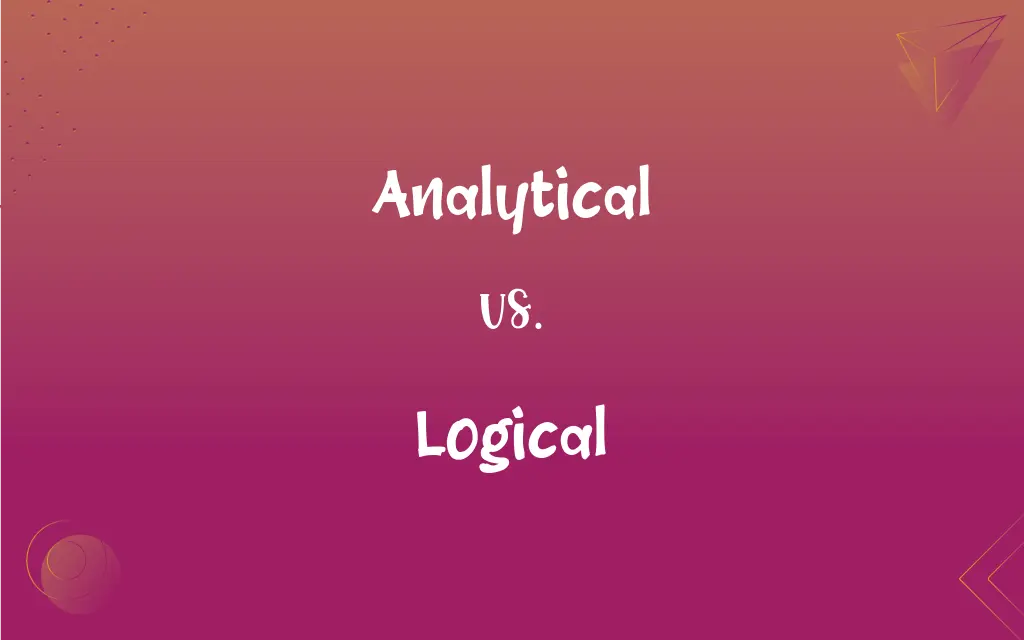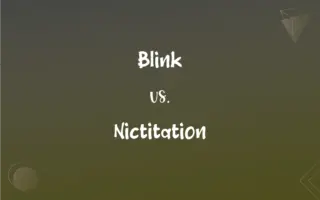Analytical vs. Logical: What's the Difference?
Edited by Aimie Carlson || By Janet White || Updated on October 5, 2023
Analytical involves examining complex structures to understand their components, often using data and information, while logical pertains to clear, sound reasoning based on valid inference. Both are cognitive processes but emphasize different aspects of p

Key Differences
Analytical thinking is an intricate process that involves breaking down complex problems or structures into smaller, understandable components. It often relies on the meticulous examination of data and information to derive conclusions or to understand underlying principles. In contrast, logical thinking emphasizes the process of reasoning in a clear and structured manner, employing valid inference to arrive at conclusions. Logical thinking often seeks to understand the relationships between elements to construct sound arguments or make decisions.
Analytical skills are essential for solving problems and making decisions based on a thorough examination of various aspects and details. These skills enable individuals to scrutinize information and dissect complex structures to understand their components and functioning. Logical skills, on the other hand, are crucial for constructing coherent arguments and evaluating the validity of statements or propositions, ensuring that reasoning is sound and conclusions are justifiable based on given premises.
Analytical and logical thinking are integral components of critical thinking, contributing to an individual's ability to make informed and rational decisions. While analytical thinking delves into the details and elements of a problem, exploring patterns and examining information, logical thinking is concerned with the structure and validity of arguments, prioritizing coherence and consistency in reasoning. Both approaches are invaluable for understanding and addressing complex issues, but they emphasize different aspects of cognitive processing.
In practical scenarios, analytical thinking might involve the use of statistical analysis, data evaluation, and pattern recognition to understand a problem or situation better. Logical thinking might focus on deducing conclusions from premises, ensuring that arguments are solid, and reasoning is unambiguous. While analytical thinking provides depth and insight into the components of a problem, logical thinking ensures the clarity and soundness of reasoning, offering a structured approach to problem-solving.
Analytical and logical thinking can complement each other, combining detailed examination with clear reasoning to provide a comprehensive approach to understanding and solving problems. Analytical insights can inform logical reasoning, while logical structures can help organize analytical findings, making both forms of thinking interconnected and mutually reinforcing.
ADVERTISEMENT
Comparison Chart
Focus
Examining components and details of complex structures.
Clear, structured reasoning based on valid inference.
Application
Problem-solving using data evaluation and pattern recognition.
Constructing and evaluating arguments and propositions.
Skills Required
Data analysis, information scrutiny, and pattern recognition.
Deductive reasoning, validity assessment, and coherence maintenance.
Goal
Understanding underlying principles and components of a problem.
Arriving at sound conclusions based on clear reasoning.
Approach
Detailed examination and exploration of patterns.
Structured and coherent deduction and inference.
ADVERTISEMENT
Analytical and Logical Definitions
Analytical
Pertaining to the detailed examination of elements or structure.
His analytical approach helped in understanding the problem's core elements.
Logical
Based on the principles of logic, emphasizing structure and validity.
Logical reasoning is crucial for evaluating propositions.
Analytical
Concerned with the decomposition of a whole into its components.
Analytical methods are used to break down complicated structures.
Logical
Characterized by clear, structured reasoning and argumentation.
Developing logical skills is essential for structured problem-solving.
Analytical
Involving the use of analysis or logical reasoning to address problems.
Analytical skills are essential for resolving complex issues effectively.
Logical
Concerned with the relationship between propositions in terms of deduction and inference.
The logical structure of the argument was sound and valid.
Analytical
Focused on the systematic examination and interpretation of data.
Analytical tools are crucial for deriving insights from data.
Logical
Conforming to the rules of logic; clear, sound, and coherent.
Logical thinking helps in deducing valid conclusions.
Analytical
Relating to the use of analytics or logical reasoning.
The analytical study revealed underlying patterns in the data.
Logical
Of, relating to, in accordance with, or of the nature of logic
Logical disputation.
Analytical
Of or relating to analysis or analytics.
Logical
Based on earlier or otherwise known statements, events, or conditions; reasonable
Rain was a logical expectation, given the time of year.
Analytical
Expert in or using analysis, especially in thinking
An analytic mind.
An analytic approach.
Logical
Reasoning or capable of reasoning in a clear and consistent manner
A very logical person.
Analytical
Dividing into elemental parts or basic principles.
Logical
(not comparable) In agreement with the principles of logic.
Analytical
Reasoning or acting from a perception of the parts and interrelations of a subject
"Many of the most serious pianists have turned toward more analytic playing, with a renewed focus on the architecture and ideas of music" (Annalyn Swan).
Logical
Reasonable.
Analytical
(Logic) Following necessarily; tautologous
An analytic truth.
Logical
(not comparable) Of or pertaining to logic.
It's not logical, it's God!
Analytical
Using, subjected to, or capable of being subjected to a methodology involving algebra or other methods of mathematical analysis.
Logical
(computing) Relating to the conceptual model of a system rather than its physical expression
Logical memory appears contiguous to an application program, but may well be stored on several physical devices, including in RAM and on hard-disks, as determined by the operating system.
Analytical
Proving a known truth by reasoning from that which is to be proved.
Logical
Of or pertaining to logic; used in logic; as, logical subtilties.
Analytical
(Linguistics) Expressing a grammatical function by using two or more words instead of an inflected form
Vietnamese is an analytic language.
Logical
According to the rules of logic; as, a logical argument or inference; the reasoning is logical; a logical argument; a logical impossibility.
Analytical
Of or pertaining to analysis; resolving into elements or constituent parts
An analytical experiment
Logical
Skilled in logic; versed in the art of thinking and reasoning; as, he is a logical thinker.
Analytical
Using analytic reasoning as opposed to synthetic.
An analytical mind
Logical
Capable of or reflecting the capability for correct and valid reasoning;
A logical mind
Analytical
Of or pertaining to analysis (definition 2).
Logical
In accordance with reason or logic;
A logical conclusion
Analytical
Of a proposition; necessarily true independent of fact or experience, such as "all spinsters are unmarried". Opposite of synthetic.
Logical
Marked by an orderly, logical, and aesthetically consistent relation of parts;
A logical argument
The orderly presentation
Analytical
Exercising or involving careful analytical evaluations; as, analytic reasoning; an analytical discussion.
Logical
Based on known statements or events or conditions;
Rain was a logical expectation, given the time of year
Analytical
Capable of or given to analyzing; - of people.
Logical
Capable of thinking and expressing yourself in a clear and consistent manner;
A lucid thinker
She was more coherent than she had been just after the accident
Analytical
Using or skilled in using analysis (i.e., separating a whole--intellectual or substantial--into its elemental parts or basic principles);
An analytic experiment
An analytic approach
A keenly analytic man
Analytical reasoning
An analytical mind
Logical
Pertaining to sound reasoning or valid inference.
His logical approach ensured the argument's coherence.
Analytical
Of a proposition that is necessarily true independent of fact or experience;
`all spinsters are unmarried' is an analytic proposition
FAQs
Can analytical thinking involve data analysis?
Yes, analytical thinking often involves the examination and interpretation of data to derive insights.
Are analytical and logical thinking the same?
While interconnected, analytical focuses on examining components and details, and logical emphasizes structured reasoning and validity.
How is logical thinking applied in everyday scenarios?
Logical thinking is applied in evaluating arguments, making decisions, and solving problems based on sound reasoning.
Does analytical thinking require pattern recognition?
Yes, analytical thinking often involves recognizing patterns to understand underlying principles.
Is logical reasoning dependent on structured argumentation?
Yes, logical reasoning relies on clear, structured argumentation to deduce conclusions.
Is logical thinking concerned with argument validity?
Yes, logical thinking evaluates the coherence and validity of arguments and propositions.
Can analytical and logical thinking complement each other?
Absolutely, analytical insights can inform logical reasoning, and logical structures can organize analytical findings.
Can one develop analytical thinking skills?
Certainly, analytical thinking skills can be developed through practice, study, and application.
Does analytical thinking contribute to problem-solving?
Absolutely, analytical thinking is a core component of effective problem-solving.
Is logical thinking essential for decision-making?
Yes, logical thinking is crucial for making sound decisions based on clear and coherent reasoning.
Is analytical thinking detailed-oriented?
Yes, analytical thinking is detailed-oriented, focusing on the components and elements of a problem or situation.
Can logical thinking be subjective?
Logical thinking aims to be objective, focusing on structure, validity, and coherence of reasoning.
Are there specific methods to enhance analytical thinking?
Yes, practicing data analysis, research, and critical thinking exercises can enhance analytical thinking.
Can logical thinking be improved with practice?
Certainly, logical thinking can be improved by regularly engaging in activities that require structured reasoning and argument evaluation.
Are analytical skills valuable in professional settings?
Yes, analytical skills are highly valued in various professional settings for decision-making and problem-solving.
About Author
Written by
Janet WhiteJanet White has been an esteemed writer and blogger for Difference Wiki. Holding a Master's degree in Science and Medical Journalism from the prestigious Boston University, she has consistently demonstrated her expertise and passion for her field. When she's not immersed in her work, Janet relishes her time exercising, delving into a good book, and cherishing moments with friends and family.
Edited by
Aimie CarlsonAimie Carlson, holding a master's degree in English literature, is a fervent English language enthusiast. She lends her writing talents to Difference Wiki, a prominent website that specializes in comparisons, offering readers insightful analyses that both captivate and inform.































































